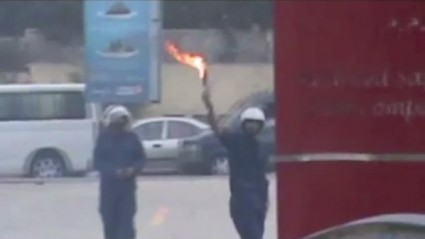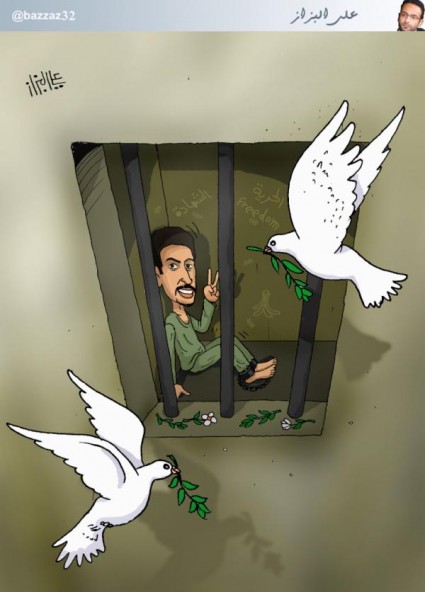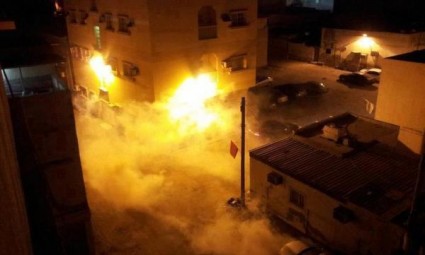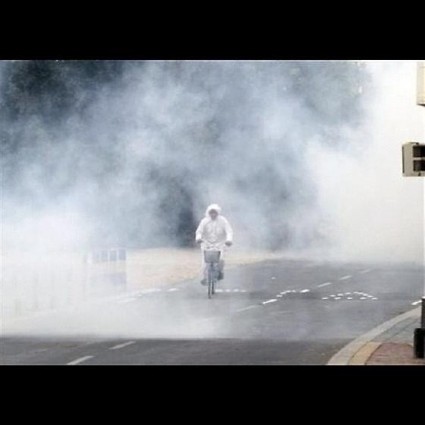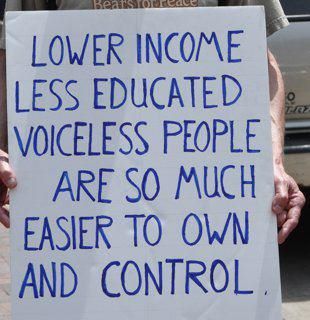Greater shift in attention to Bahrain by Russia and China could help counter US reckless adventurism in region
July 25, 2012 Add Comments
Secretary Clinton is this what your made King Hamad Hire Chief John Timoney for?
July 24, 2012 Add Comments
President Obama Stop the Chemical Gassing in Bahrain and Free the Political Prisonerswaja
July 24, 2012 Add Comments
Bahrain Regime Uses Chemical Gas against Villagers as they Sleep – President Obama is “okay” with that…
July 24, 2012 Add Comments
Bahrain Citizen “suited up” against US Supplied Military Chemical Weapons in Bahrain
July 24, 2012 Add Comments
Chemical Weapons in Syria – US supplies and condones Chemical Weapons use against Bahraini Oppostion every day
Double Cappuccino With a Shot of Tear (or Other) Gas, Please
24 July, 2012 – Voices of The Arab Spring
The world is freaking out today with news of Syria’s admission of having chemical weapons. It’s been an open secret that Syria has had these weapons for years. According to the NYT:
“Over the past four decades, Syria has amassed huge supplies of mustard gas, sarin nerve agent and cyanide, according to unclassified reports by the Central Intelligence Agency.”
So the real headline is that something has changed in Syria to get the regime to play their hand, to acknowledge their stockpile instead of denying it or ignoring accusations. Personally, I think this could be a big sign Syria is scared and injured. Just like a badly wounded animal backed into a corner, Syria is thrashing about in a last-ditch effort, desperate to preserve itself (or deter) using any means necessary.
But with all this talk of Syria and dangerous gasses, I want to bring up Bahrain–the forgotten revolution.
When doing research in Bahrain, I heard multiple stories of police firing teargas into homes, then closing and locking all the doors and windows. At the time of my stay, around 30 had been killed by teargas suffocation alone–one victim was a baby only a few days old.
Here is a Bahraini woman I interviewed at the big Formula One protest in April of this year… (really, I guess it’s more of a statement, as she was so passionate I couldn’t get any of my own questions in to ask!):
Now… the above video was filmed during a peaceful (and legal) march of thousands of Bahrainis (not just Shia, I also met quite a few Sunnis) during the weekend of the Grand Prix Formula One Race. After the official demonstration ended, on the way back to my car, I heard faint explosions, gun fire and screaming. As the violence got louder (and the frantic rumors ripping through the crowd became more intense), I ran toward the Costa Coffee in the mall, the place where the march started, so I could take cover. But on the way, I ran into some clashes and got a big dose of teargas. Water streamed from my eyes and nose, my throat burned and my lungs felt agitated and tight. All my mucous membranes burned with a hot pepper and radish fire. With a few other people, I moved through the crowd and into Costa Coffee where hundreds of Bahrainis were trying to both watch the intensifying violence and run from it at the same time. The sirens, gunfire and sounds of explosions came closer and closer. …more
July 24, 2012 Add Comments
‘Bahrain crisis should top the agenda of proposed Islamic summit in Mecca’
‘Bahrain crisis should top the agenda of proposed Islamic summit in Mecca’
24 July, 2012 – Voice of Bahrain
TEHRAN – Iranian Foreign Ministry spokesman Ramin Mehmanparast has said that if an extraordinary summit of Muslim leaders is supposed to be held in Mecca, the crisis in Bahrain should be top of the agenda.
Mehmanparast made the remarks during his regular press briefing in Tehran on Tuesday in response to a question about the fact that Saudi Arabian Foreign Minister Saud al-Faisal said on Sunday that King Abdullah of Saudi Arabia had called for an emergency Islamic summit in Mecca on August 14 and 15 to address risks of “sedition” threatening Muslim countries.
The Iranian Foreign Ministry spokesman stated, “We will welcome any meeting that brings together Muslim countries and will actively participate in it. But the crises are obvious, and it is also clear which countries are taking interventionist measures. If such a meeting is supposed to be held, resolving Bahrain’s crisis” should be top of the agenda.
West is undermining security of global energy supplies
Mehmanparast also replied to a question about the fact that the Wall Street Journal on July 19 quoted unidentified U.S. government officials as claiming that Iran has developed plans to disrupt international oil trade, including attacks on oil platforms and tankers.
“Such remarks have no logical basis, and the countries that disrupt the global oil market are Western countries, particularly the United States,” he said.
“They are seeking to undermine the security of” the world’s energy supplies, Mehmanparast noted, adding, “The exertion of political pressure on companies undermine the security of the oil trade market.”
Iran is making every effort to provide the security of the world’s energy supplies, he stated. …more
July 24, 2012 Add Comments
Syria – redefining the Geopolitical boundaries in the Middle East
Syrian blood etches a new line in the sand
Pepe Escobar – Asia Times – 23 July, 2012
Once upon a time, early in the previous century, a line in the sand was drawn, from Acre to Kirkuk. Two colonial powers – Britain and France – nonchalantly divided the Middle East between themselves; everything north of the line in the sand was France’s; south, it was Britain’s.
Many blowbacks – and concentric tragedies – later, a new line in the sand is being drawn by Saudi Arabia and Qatar. Between Syria and Iraq, they want it all. Talk about the return of the repressed; now, as part of the North Atlantic Treaty Organization-Gulf Cooperation Council compound, they’re in bed with their former colonial masters.
Blow by blow
No matter what militarized Western corporate media spins, there’s no endgame in Syria – yet. On the contrary; the sectarian game is just beginning.
It’s 1980s Afghanistan all over again. The over 100 heavily armed gangs engaged in civil war in Syria are overflowing with Gulf Cooperation Council funds financing their Russian RPGs bought on the black market. Salafi-jihadis cross into Syria in droves – not only from Iraq but also Kuwait, Algeria, Tunisia and Pakistan, following enraged calls by their imams. Kidnapping, raping and slaughtering pro-Assad regime civilians is becoming the law of the land.
They go after Christians with a vengeance. [1] They force Iraqi exiles in Damascus to leave, especially those settled in Sayyida Zainab, the predominantly Shi’ite neighborhood named after Prophet Muhammad’s grand-daughter, buried in the beautiful local mosque. The BBC, to its credit, at least followed the story. [2]
They perform summary executions; Iraq’s deputy interior minister Adnan al-Assadi told AFP how Iraqi border guards saw the Free Syrian Army (FSA) take control of a border outpost and then “executed 22 Syrian soldiers in front of the eyes of Iraqi soldiers”.
The Bab al-Hawa crossing between Syria and Turkey was overrun by no less than 150 multinational self-described mujahideen [3] – coming from Algeria, Egypt, Saudi Arabia, Tunisia, the United Arab Emirates, Chechnya and even France, many proclaiming their allegiance to Al-Qaeda in the Islamic Maghreb (AQIM).
They burned a lot of Turkish trucks. They shot their own promo video. They paraded their al-Qaeda flag. And they declared the whole border area an Islamic state. ….more
July 24, 2012 Add Comments
Chemical Weapons in Hezbollah’s Hands?
Chemical Weapons in Hezbollah’s Hands?
By: Ibrahim al-Amin – 24 July, 2012 – Al Akhbar
Israel has been insisting that Hezbollah was behind the bombing in Bulgaria, as well as a similar failed attempt in Cyprus, and that it is planning more such attacks against Israeli targets both in the occupied territories and abroad. It has been saying that the party operates cells in cooperation with the Iranians in many parts of the world. People have appeared on cue to reveal information about plans and preparations in the Far East, or details of sleeper cells deployed on the American continent, while the world’s intelligence agencies have stepped up their efforts to provide extra protection to participants at the Olympic Games in Britain.
Israel acts on the premise that Hezbollah is a strong enemy. It has conceded its military and intelligence prowess in the wars it has fought with it in Lebanon and Palestine. It concedes that it strives to make best use of the element of surprise, and has done so often and in a variety of ways and contexts. It has for years – especially since one of its special units succeeded in assassinating Hezbollah military leader Imad Mughniyeh – been forced to use extra security precautions for personnel, establishments and facilities in Israel and abroad. Israel knows that it committed a major crime against an enemy it always knew would punish it for its deed. But the constant security alert has itself become part of the punishment, leaving some Israeli leaders wishing Hezbollah would get its revenge over and done with.
Israel’s problem with Hezbollah these days is not confined to its charge that it is behind these attacks. It increasingly fears the prospect of the Lebanese resistance’s military capability being given an unprecedented boost as a result of the crisis in Syria. Israeli military chiefs have long acted on the assumption that Hezbollah probably has access to any strategic weapons Syria possesses. What worries them now is that developments could result in Hezbollah gaining sole control of these weapons.
Moreover, they believe that the Syrian crisis, and its impact on the already raging Lebanese crisis, may have freed Hezbollah from certain considerations and constraints, thus leaving it with a freer hand with regard to weaponry, or even to initiating military operations.
Israel, like most of the West, always used to see the Syrian regime as having the virtue of being able restrain the Palestinian and Lebanese resistance. It was the player to address when dealing with tensions related to these forces. But in its current state, it is out of earshot. The threat, therefore, is not just of these forces acquiring such weapons, but of their being able to use them for purposes that may be purely their own.
The enemy’s problem is not with the actual possession of chemical or biological weapons. It knows, as does every industrialized country and every scientist, that it is not difficult or complicated to produce these deadly materials. On the contrary, the spread of scientific know-how over the past three decades has made it possible for many to acquire them if they want to.
Israel’s problem is with the prospect of missiles in the possession of Syria and the resistance in Lebanon, or even in Palestine, being fitted with these weapons. Anyone who can deliver half a ton of high explosives to any point in Israel can do the same with a chemical or biological warhead.
Could Israel live with the idea of an enemy of Hezbollah’s size being able to counter-balance its nuclear arms with weapons no less deadly?
Israel knows, most certainly, that some weapons are there to be owned rather than used. It knows that the value of its nuclear weapons does not lie in their possible use, but in the ability they give it to threaten, and to limit the ambitions of its enemies in any war. Its concern today is that the list of what it has long called “balance-breaking weapons” is no longer confined to Scud missiles and their variants, updated or upgraded air defenses, or high precision long-range missiles. Rather, the term is being redefined in ways that were previously inconceivable. Could Israel live with the idea of an enemy of Hezbollah’s size being able to counter-balance its nuclear arms with weapons no less deadly? …more
July 24, 2012 Add Comments
EU not impressed by Israeli, “Bulgarian, false flag” operation – Refuses “Israel’s” Request to Blacklist Hizbullah
EU Refuses “Israel’s” Request to Blacklist Hizbullah
Local Editor – moqawama.org – 24 July, 2012
Despite all “Israeli” pressures, the European Union turned down Tuesday an “Israeli” request to blacklist Hizbullah on its list of terrorism.
“There is no consensus for putting Hizbullah on the list of terrorist organizations,” said Cypriot Foreign Minister Erato Kozakou-Marcoullis, whose country currently holds the rotating EU presidency.
Sitting alongside the Cypriot minister at a news conference held after annual EU-“Israel” talks, “Israeli” Foreign Minister Evigdor Lieberman claimed that: “the time has come to put Hizbullah on the terrorist list of Europe.”
“It would give the right signal to the international community and the “Israeli” people.”
But Kozakou-Marcoullis responded to the bold “Israeli” call by saying: “Hizbullah is an organization comprising a party as well as an armed wing and is active in Lebanese politics”.
“Taking into account this and other aspects there is no consensus for putting Hizbullah on the list of terrorist organizations,” she said.
“The EU would consider this if there were tangible evidence of Hizbullah engaging in acts of terror,” she added. …source
July 24, 2012 Add Comments
Bahrain “Police” ‘dodge security clean-up by torturing detainees at secret sites’
Police ‘dodge security clean-up by torturing detainees at secret sites’ – The Times, London
by Hugh Tomlinson – 23 July, 2012 – BJDM
Bahrain has begun an investigation into allegations that police are using “black sites” to beat and torture anti-government protesters, dodging efforts to clean up security forces in the Gulf state.
The accusations cast more doubt on government claims to have overhauled police practices since an independent inquiry found systematic human rights abuses during a crackdown on anti-government protests last year. More than 80 people have been killed in the 17-month uprising.
The Bahraini regime had previously denied that the black sites existed, despite persistent allegations that beatings and torture had continued unabated since the report was published in November. But officials now admit privately that some police officers have continued to operate outside the law.
Opposition groups claim that a youth centre just outside the capital, Manama, and a police equestrian centre in the western district of Budaiya, have been used to beat and interrogate detainees before they are transferred to police stations, where stricter procedures are now in place. Cameras have now been installed outside the two sites, identified in testimony to human rights groups, to monitor those going in and out.
Both complexes lie opposite police stations and among villages that have been at the centre of the Shia-led uprising that broke out across Bahrain last year demanding democratic reform from the country’s Sunni elite. The Times spoke to one young man, who did not want not be identified, who said he has been tortured at the youth centre in June. “They beat me with a stick and a belt, and kicked me,” he said.
In April Human Rights Watch cited consistent accounts of police using secluded buildings or plots of land to abuse prisoners, including children, before taking them to a station. …more
July 24, 2012 Add Comments
US-backed Bahrain regime uncivilized: Mohsen Saleh
July 24, 2012 Add Comments
The falling House of Saud – Threats from the Inside and Outside
Saudi Arabia: Threats from the Inside and Outside
24 July, 2012 – by American Bedu
It is now the holy month of Ramadan when Muslims the world round are to fast from sun rise to sun set in addition to reflecting on their religion and their life. It is the time when Muslims are too not only reach out to those less fortunate but also to feel themselves the pangs of hunger and suffering. It is also a time to cleanse and revitalize the body with the spirit of Ramadan.
However, at the same time that Ramadan is taking place, so are other changes both from within and outside of Saudi Arabia. All military and defense personnel have been recalled from leave or training and called back to their duty stations. Even expatriate workers in the medical sector have had their leaves cancelled and required to remain in the Kingdom.
Why? The answer is predominantly three-fold. Continuing demonstrations and uprisings are taking place in Saudi Arabia’s Eastern province. These recent demonstrations have been larger and more organized than past demonstrations. There is concern that groups will travel and continue these demonstrations in the streets of Riyadh.
Further bans have been placed on Iran and its ability to export oil. Saudi Arabia increased its production to reduce oil prices and to prevent Iran from making as much revenue. Now, there are concerns that Iran might attempt to retaliate against Saudi Arabia.
Each year there are security concerns associated with Ramadan and the mass influx of pilgrims from around the world in to the Kingdom during the month of Ramadan. This always places security forces and medical personnel in Saudi Arabia on alert.
Other indications which further substantiate the increased concerns in the Kingdom include placement of Saudi’s industrial sector (which includes oil production and storage facilities) were recently transferred to the jurisdiction of the Ministry of Interior. It is now the Ministry of Interior responsible for the protection and security of this vital sector and resource.
Prince Muqrin bin Abdul-Aziz was the head of Saudi’s Intelligence agency until just a few short days ago. He is now a special advisor to King Abdullah. In Prince Muqrin’s place is Prince Bandar bin Sultan. Prince Bandar is now both Secretary General of Saudi Arabia’s National Security Council and head of Saudi’s Intelligence Service. …more
July 24, 2012 Add Comments
Saudi Kingdom Rocked by Protests as Waning Monarchy Comes to a Close
Saudi Kingdom Rocked by Protests
by Stephen Lendman – Global Research, 22 July, 2012
On February 14, 1945, Franklin Roosevelt met with Saudi King Ibn Saud on the USS Quincy. A nearly seven decade relationship followed.
America was guaranteed access to what the State Department called “a stupendous source of strategic power, and one of the greatest material prizes in world history.”
It explains much about Washington’s obsession with controlling the region. It has around two-thirds of the world’s proved oil reserves and major natural gas supplies.
Little wonder America supports what some observers call the world’s most repressive regime. State terror is policy. Freedom is prohibited. Authority rests solely with the ruling Al Saud monarch and members of the royal family.
Currently King Abdullah bin Abdul Aziz holds power. Nearly aged 88, he’s in poor health. Salman bin Abdul Aziz is crown prince. He also has health problems. A stroke left him bedridden for weeks. They and other family members rule despotically.
Democracy is strictly forbidden. The nation’s Constitution affords ordinary citizens and other residents no rights. Women are especially marginalized and denied.
Political parties and national elections are prohibited. Saudi kings appoint a Council of Ministers. It includes a prime minister, first and second deputies, 20 ministers, various advisors, and heads of major autonomous organizations.
The Kingdom has 13 provinces. Ruling monarchs appoint governors. They’re either princes or close royal family relatives. In 1993, ministers became subject to four-year term limitations. In 1997, a Consultative Council was expanded from 60 to 90 members.
Media are tightly controlled. Most web sites are blocked. Islam is the Kingdom’s state religion. Observing others is prohibited.
Anyone dissenting is subject to arbitrary arrest and detention. Political critics, bloggers, academics, foreign nationals, and humanitarian activists are especially vulnerable.
Saudi journalist Khaled al-Harbi said annual Kingdom revenue exceeds $400 billion. Amounts fluctuate depending on oil prices. At the same time, the average Saudi citizen earns around $400. Al-Harbi says 60% of the population live in poverty.
Official Consultative Assembly of Saudi Arabia (Shura) figures claim 22% of Saudis are impoverished (around three million people). Including migrants and other non-residents, it’s believed the true figure approaches al-Harbi’s estimate.
A wealth disparity chasm between rich and poor exists. Income depends on how royal family members distribute it. They and privileged elites get most of it. Most Saudis go begging. Migrants and other non-citizens fare worse.
Unemployment is high. Official figures mask its severity. Young people comprise two-thirds of the Kingdom’s 26 million population. An estimated 40% of 20 to 24 year-olds have no jobs. Even well educated Saudis are affected. So are most women.
Around 80% of workers are non-nationals. Most are regional migrants. With no rights whatever, they work for near slave wages. Saudi citizens are shut out.
The Kingdom is largely Sunni. Minority Shiites are marginalized and persecuted. Deep-seated social tensions result. Eastern Province areas are especially affected. Around 90% of proved Saudi reserves are located there. …more
July 24, 2012 Add Comments
Clashes in Bahrain over opposition clampdown
Clashes in Bahrain over opposition clampdown
The Associated Press – 24 July, 2012 – Las Vegas Sun, USA
Thousands of anti-government protesters in Bahrain clashed Friday with riot police firing tear gas during demonstrations against plans to limit political marches.
Street battles took place in several places around the strategic Gulf island kingdom, which is home to the U.S. Navy’s 5th Fleet.
Many protesters denounced plans by Bahrain to halt giving permits for opposition marches on roadways and other areas, saying they disrupt traffic and everyday life.
Bahraini officials, meanwhile, are studying other possible locations for political demonstrations.
The kingdom has been gripped by more than 17 months of clashes between the Sunni monarchy and protesters from the kingdom’s Shiite majority, which claims it faces systematic discrimination.
At least 50 people have been killed in unrest in Bahrain since February 2011. …source
July 24, 2012 Add Comments
World Powers busy brokering deals over Syria – without Syria
Russia, Saudi Arabia discuss ways out of Syrian crisis
(Xinhua) – 24 July, 2012
MOSCOW, July 23 (Xinhua) — Russian Foreign Minister Sergei Lavrov and his Saudi Arabia counterpart Saud al-Faysal discussed approaches to solve the Syrian crisis during a phone conversation, the foreign ministry said on Monday.
Lavrov once again called for an immediate end to violence in Syria and a broad national dialogue involving all Syrian political forces, according to a statement issued by the ministry.
“The ministers exchanged opinions on key aspects of the Syrian problem. The Russian side called for an immediate end to violence, whoever it came from, and a broad national dialogue involving all Syrian political forces,” the ministry said on its website.
Russia reiterated its call for consolidated efforts to ensure the implementation of a peace plan proposed by the UN-Arab League joint special envoy Kofi Annan which aimed at promoting the peaceful settlement of the crisis.
Saud al-Faysal informed Lavrov about the results of an emergency meeting of Arab League’s foreign ministers in Doha on Sunday.
Russia upheld the Arabia League’s approaches to acute regional matters and thought this alliance was capable of passing “weighed and attainable” decisions, taking into account the opinions of all its members, Lavrov said.
“The joint principles worked out at a Russia-AL ministerial meeting in Cairo on February 10 were taken into account by Kofi Annan in his six-point plan for Syria,” the foreign ministry said.
The two diplomats agreed to continue contacts between Moscow and Riyadh over the Syrian crisis.
“The sides reaffirmed their interest in holding the second round of Russia-Persian Gulf Cooperation Council strategic dialogue in Moscow this year,” the ministry said.
The Arab League on Monday urged Syrian President Bashar al- Assad to step down and promised a “safe exit” for him and his family if he agrees to give up power. It also called for the United Nations to hold an emergency meeting on Syria to discuss cutting diplomatic ties with the Arab country.
In response, the Syrian administration slammed the AL calls for Assad to step down as “flagrant interference” into its domestic affairs. …source
July 24, 2012 Add Comments
Bahrain Dry Dock Prisoners beaten on start of Ramadan
A political detainee in Dry Dock Prison is facing a serious danger to his life due to his deteriorating health situation…
Bahraini prisoners are beaten during the first day of the holy month of Ramadan
24 July, 2012 – ABNA
(Ahlul Bayt News Agency) – A political detainee in Dry Dock Prison is facing a serious danger to his life due to his deteriorating health situation. The detainee has suffered from severe bleeding as a result of his injuries and has been denied proper treatment. Reports confirmed that he has been taken to a non-specialized clinic, but the level of his injuries requires treatment in a hospital.
Other reports from the prison confirm that detainees have been exposed to mistreatment along with a low level of hygiene and sub-standard food. This is of particular concern for those imprisoned since the beginning of the holy month of Ramadan who are fasting in a bad environment with improper feeding and a prison administration that ignores the need for basic hygiene.
The poor conditions exist despite a number of prisoners demanding an improvement in their prison environment. …source
July 24, 2012 Add Comments
UAE borrow Bahrain Regime repression tactics, including arbitrary arrest and detention
Authorities resort to new wave of arbitrary arrests to bolster stability
24 July, 2012 – Reporters Without Borders
In the United Arab Emirates, claiming one’s rights is treated as a crime against state security, as demonstrated by another wave of arrests of campaigners and human rights activists between 16 and 19 July. Eighteen people were arrested, of whom 17 are still held.
Several netizens and bloggers were also detained, including Khalifa Al-Nuaimi, Rashid Omran Al Shamsi, Omran Al Radhwan, Abdullah Al-Haajri, the lawyer Salim Hamdoon Alshehhi and Juma Darwish Al-Felasi . Two human rights lawyers, Mohamed Al-Mansoori, the former president of the United Arab Emirates Jurists Association, and Mohamed Abdulah Al-Roken, a defence lawyer in the in so-called “UAE 5” case, were also on the list of detainees.
The group faces charges of opposing the constitution and the basic principles of the UAE ruling system, in addition to having links and affiliations to organisations with foreign agendas. The Abu Dhabi public prosecutor, Salem Saeed Kubaish, said they “are being held in preventive custody for investigation”.
The arrests were made a day after the authorities announced the existence of a group alleged to be plotting against national security.
Reporters Without Borders calls for their immediate release. “The authorities must put an end to successive arrests of campaigners and human rights campaigners, which flagrantly violates basic freedoms,” the organization said. …more
July 24, 2012 Add Comments
British Mercenaries Train US back Al Qaeda in Syria
Britain’s ex-army commandos train armed rebels in Syria: UK media
25 July, 2012 – Shia Post
Britain’s former Special Air Service (SAS) commandos are reportedly training armed opposition groups fighting against the government of Syrian President Bashar al-Assad, reports say.
The Daily Mail and Sunday Express have revealed that the mercenaries have set up training camps in Iraq and on the Syrian border for the armed rebels.
British army sources, speaking on condition of anonymity, have said the militants are receiving instructions in military tactics, weapons handling and communications systems.
Groups of 50 militants at a time are being trained by two Mideast-based private security firms which employ former SAS personnel.
More than 300 rebel forces have completed the commando training program, and are said to account for a number of the opposition’s combatant units fighting Syrian security forces in Damascus.
Britain has also placed more than 600 troops on standby over the unrest in Syria.
UK Foreign Secretary William Hague says London should be acting outside the UN Security Council and step up its support for militant groups in Syria.
Syria has been the scene of violence by armed groups since March 2011.
Damascus blames “outlaws, saboteurs, and armed terrorist groups” for the unrest, asserting that it is being orchestrated from abroad. …more
July 24, 2012 Add Comments
US backed Al Qaeda bombing Iraq and Syria
Al-Qaeda behind terrorism in both Iraq and Syria: Iraqi MP
25 July, 2012 – Shia Post
An Iraqi parliamentarian has tied the latest chain of terror attacks and persisting insecurity in Iraq to the foreign-sponsored unrest in Syria, insisting that the sources of the violence in both countries are the Saudi-backed al-Qaeda terror elements.
“It is clear that there is direct connection between the events in Syria and the [persisting] insecurity in Iraq and those that conduct murder and bombings in Iraq are the same people who are currently engaged in bombing and killing the Syrian people,” said Hakem al-Zameli, a member of Iraqi parliament committee on security and defense, Alsumaria Iraqi TV website reported Tuesday.
Al-Zameli went on to insist that “most of those (involved in terror) are members of al-Qaeda.”
The Iraqi parliamentarian further demanded that the Iraqi government and the nation’s security establishment take serious steps to “support Iraqi citizens by confronting the sources of insecurity.”
He also emphasized that in the past 10 years Iraq has been struggling against terrorism, led by country’s ministries of interior and defense. …more
July 24, 2012 Add Comments
High-level EU-Iran meeting on nuclear row Tuesday: diplomats
High-level EU-Iran meeting on nuclear row Tuesday: diplomats
24 July, 2012 – Agence France Presse
ISTANBUL: Senior European and Iranian diplomats were set to meet in Istanbul on Tuesday to seek common ground on Tehran’s disputed nuclear drive, officials said.
The meeting, to be held at a secret location and closed to the press, will start at 10:30 am (0730 GMT), according to Maja Kocijancic, a spokeswoman of EU foreign policy chief Catherine Ashton.
An Iranian foreign ministry spokesman, Ramin Mehmanparast, told a press briefing in Tehran: “The goal is to bring the positions of Iran and the P5 1 closer together,” referring to the five permanent members of the UN Security Council plus Germany.
“We must wait for the outcome of the meeting,” he added.
The P5 1 has asked Iran to immediately stop enriching uranium to the high level of 20 percent, to ship out its existing 20 percent stock and to shut down a fortified underground enrichment facility.
Tuesday’s talks between the two high-ranking diplomats, Helga Schmid and Ali Bagheri, were announced on July 4 following a technical meeting in Istanbul.
The two have been in regular contact as global powers seek to reach an understanding with Iran over its disputed nuclear programme, Schmid working with the EU and Bagheri assisting chief Iranian negotiator Saeed Jalili.
Their meeting will be followed by a “contact” between Ashton, who is leading negotiations with Iran in the name of the P5 1, and Jalili, according to a spokesman for Ashton, Michael Mann.
The P5 1 and Iran made no breakthroughs in the row in talks in Moscow held June 18 and 19.
But a meeting of experts here in early July staved off a total breakdown of the diplomatic process, with Russia citing “certain progress.”
Iran insists it has a right to uranium enrichment under the nuclear Non-Proliferation Treaty, which it says should be recognised by the P5 1. It also wants Western sanctions punishing its economy to be eased.
….more
July 24, 2012 Add Comments
Iran Nuclear device so powerful even the thought of it provokes War response – in Syria
Apparently Iran has no intention on a Nuclear Bomb, even experts from the Mossad and Penatta himself have made statements to this effect as recently as February and March of 2012. So why the War footing, the escalation and the sanctions? Could it be all of this was deeded necessary to “contain Iran” as the West goes in to finish off Syria? With more sanctions against Iran and and intensified aggression against Syria in the works, it would seem Western Powers know no bounds in the violence and aggression as they seek to assert their most dominate presence in the Middle East ever. Phlipn
U.S. Agencies See No Move by Iran to Build a Bomb
By JAMES RISEN and MARK MAZZETTI – 24 February, 2012 – NYT
WASHINGTON — Even as the United Nations’ nuclear watchdog said in a new report Friday that Iran had accelerated its uranium enrichment program, American intelligence analysts continue to believe that there is no hard evidence that Iran has decided to build a nuclear bomb.
Recent assessments by American spy agencies are broadly consistent with a 2007 intelligence finding that concluded that Iran had abandoned its nuclear weapons program years earlier, according to current and former American officials. The officials said that assessment was largely reaffirmed in a 2010 National Intelligence Estimate, and that it remains the consensus view of America’s 16 intelligence agencies.
At the center of the debate is the murky question of the ultimate ambitions of the leaders in Tehran. There is no dispute among American, Israeli and European intelligence officials that Iran has been enriching nuclear fuel and developing some necessary infrastructure to become a nuclear power. But the Central Intelligence Agency and other intelligence agencies believe that Iran has yet to decide whether to resume a parallel program to design a nuclear warhead — a program they believe was essentially halted in 2003 and which would be necessary for Iran to build a nuclear bomb. Iranian officials maintain that their nuclear program is for civilian purposes.
In Senate testimony on Jan. 31, James R. Clapper Jr., the director of national intelligence, stated explicitly that American officials believe that Iran is preserving its options for a nuclear weapon, but said there was no evidence that it had made a decision on making a concerted push to build a weapon. David H. Petraeus, the C.I.A. director, concurred with that view at the same hearing. Other senior United States officials, including Defense Secretary Leon E. Panetta and Gen. Martin E. Dempsey, the chairman of the Joint Chiefs of Staff, have made similar statements in recent television appearances.
“They are certainly moving on that path, but we don’t believe they have actually made the decision to go ahead with a nuclear weapon,” Mr. Clapper told the Senate Select Committee on Intelligence. …more
July 24, 2012 Add Comments
Gas Canister Shot to the Leg – that ones going to leave a mark
July 23, 2012 Add Comments
Neoliberal Desgin for Free Society – Free of you and I
July 23, 2012 Add Comments
Hamad Free The Prisoners of Conscience
Bahrain Urged to Free Prisoners of Conscience
23 July, 2012 – POMED
Amnesty International has urged the Bahraini government to free all prisoners of conscience following the crackdown of security forces on peaceful protests last Friday. Thousands of protesters continued to clash with police throughout the weekend in reaction to government plans to limit political marches. On July 24th, a court will consider the appeal of prominent human rights activist Nabeel Rajab against his three-month prison sentence on charges related to a post he made on Twitter. Hassiba Sahraoui, Amnesty International’s Middle East and North Africa Deputy Programme Director, condemned Rajab’s conviction and that of several Bahraini doctors, saying, “The charade of justice has gone on too long in Bahrain” and added, “All convictions against them should be quashed.”
Bahrain Interior Minister Sheikh Rashid al-Khawaja met with several Congressmen and senior government officials in Washington, D.C. over the weekend. Al-Khawaja discussed the “implementation of the recommendations of the Bahrain International Commission for Inquiry” with CIA Director David Petraeus and Senator John McCain (R – AZ). The interior minister also claimed that Bahrain was “on the path to democratic reform.” Additionally, Bahraini police announced the arrest of a “terrorism” suspect, accused of possession and production of “explosives for terrorist aims.” …more
July 23, 2012 Add Comments

